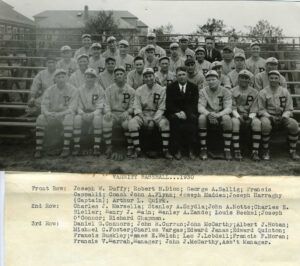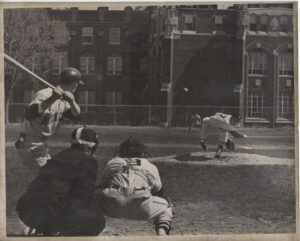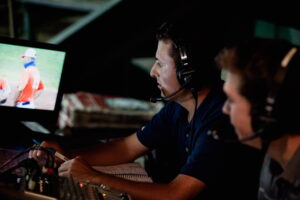Tag: college baseball
’99: The Final At-Bat
by Joshua Lopes on May 6, 2021
Friar Sports
The Story of Providence College Baseball
Thomas Zinzarella ’21
Sports Staff
27 minutes is not nearly enough time to recount the entire history of the Providence College baseball program. Figuring out how to tell the story was even more difficult. For a film class this year, I was tasked with creating a sports documentary. There was only one story I knew I wanted to tell. The story of the baseball program.
It has been 21 years now since Title IX, among other decisions, forced Providence College to cut the men’s baseball program along with the men’s tennis and golf teams. To this day, there are no signs of resurrecting them. If you walk around the campus today, remnants of the Friar program can be found in Alumni Hall. There, you can catch a glimpse of some of the trophies, or some of the players’ likenesses on the wall of the athletic hall of fame.

Baseball was once a sport for some of the most talented players in the Northeast, especially right here in Rhode Island. The first varsity sport founded on PC’s campus in 1921, the baseball team faced off with schools that many are familiar with today, such as the College of the Holy Cross, Villanova University, and more. As the character Terrence Mann said in the baseball hit movie Field of Dreams, “The one constant through the years has been baseball.” The program made it through turbulent times in the country such as the Great Depression and World War II.

One obstacle that it could not beat, however, was Title IX. Many universities and colleges in the ’90s were starting to face a problem that Providence College had just begun facing; The costs of programs were starting to escalate, and some schools’ athletics programs were not in compliance with Title IX. Many schools had met the criteria for female students, but not for female student-athletes.
In my film, ’99: The Final At-Bat, I examine more of this issue, in addition to the history behind the program and the final season that saw the Friars capture success. It features interviews from former head coach Charlie Hickey, former players such as Marc Desroches ’99, and more.
The death of the baseball program here at PC mirrors a Greek tragedy. The 1990s brought some of the team’s greatest success, with multiple Big East titles and NCAA tournament appearances, before being gutted in the fall of 1998. Competing in one last season, the Friars not only set the school record for wins, but also captured the Big East title and a spot in the NCAA tournament. There, they would fall to the No. 2 overall seed and national runner-up that year, Florida State University.
The Friars showed that blue collar work ethic that many Rhode Islanders and New Englanders pride themselves on after dropping their first game to Jacksonville University. They then roared back to win the next two games, knocking off JU, and moving on to face FSU. With a lack of PC pitching depth in the short term, Florida State defeated the Friars, but it was something that all college baseball fans could admire. At the end of the year, PC was not only the best team in New England, but Baseball America also ranked the Friars in the final top 25 at the conclusion of the NCAA Tournament.
The only thing left from the team are the stories from fans, players, and students alike who not only saw the team, but lived it. If you look around the college baseball landscape today, Boston College and the University of Connecticut have sustained success as top programs in the Northeast. But there’s a team missing from that bunch, and it just makes you wonder where PC would be in that mix.
BROADCASTING DURING A PANDEMIC
by The Cowl Editor on September 17, 2020
Sports
The Call From the Booth During a Hectic Summer
by Thomas Zinzarella ’21
Sports Staff
When the sports world came to a halt in the middle of March, my broadcast partners and I were at Madison Square Garden, taking in the first half of the Big East Tournament matchup between St. John’s University and Creighton University.
We were awaiting the following game in which the Providence College Men’s Basketball Team was to face off against Butler University. While other college basketball conferences started to shut down their basketball tournaments due to the COVID-19 pandemic, the Big East was one of the last conferences to shut down basketball.
As I walked out of an empty MSG and hopped on the Amtrak train back to Hartford, CT, I had no idea what the future would hold. I had no idea that I would be stuck in my house for over two months without any live sports on television. Even worse, I had no idea the next time I was going to broadcast a sporting event. With March Madness canceled and the remainder of winter and spring sports put on hold, I would have to wait for my summer internship where I was slated to work with the Newport Gulls of the New England Collegiate Baseball League (NECBL.)

The first summer collegiate league to go down due to COVID-19 was the prestigious Cape Cod Baseball League, where I had worked the previous two summers with the Orleans Firebirds and the Harwich Mariners. It was the first time since World War II that there would be no summer baseball on the Cape.
With the plug getting pulled on the Cape League season, I knew this did not bode well for the NECBL. However, plans for the NBA and other professional leagues gave me some hope. The Coastal Plain League, another summer collegiate league in the Carolinas and Georgia, provided me with even more hope when teams announced their plan for summer games.
In the late evening hours of May 1, my worst fears came true: the board of directors canceled the NECBL season. Just like many other broadcasters and employees in sports, I was left without a job. As the calendar rolled from May to June, I was planning on caddying at a golf course in Rhode Island.
Scrolling through Twitter one day, I saw a new summer baseball league was formed: the Newport Collegiate Baseball League. My contact with the Newport Gulls created the new league and enlisted me to be the main play-by-play broadcaster.
The games were to be played at Cardines Field in Newport. There would be four teams who would play an 18-game schedule followed by playoffs. Just like with all of the other professional leagues, COVID-19 regulations had to be followed. Players were required to sit six feet apart in the stands, no fans were allowed into the ballpark, and players on the base paths had to wear masks.
Compared to my previous two summers on the Cape, this summer was drastically different. There was no crowd noise, no sideline interviews, and only local players from Rhode Island, Connecticut, and Massachusetts were allowed to play. The few players from out-of-state had to stay in houses in Rhode Island. During a normal summer, players would stay with host families, but that was obviously not a possibility this year. Even on the baseball operational side of things, there were limitations. Only a handful of interns were allowed into Cardines Field.
The games were all televised via Twitch and YouTube. Additionally, Cox Television picked up 15 games that were streamed throughout Rhode Island and across the country. Games were played on Thursdays, Fridays, and Sundays. Each weekend consisted of two games: one at 1 p.m. and one at 6:30 p.m.
The level of talent varied as there were players from Power Five schools all the way to some of the best Division III schools in the Northeast. There were players who competed in the NECBL or even in the Cape Cod Baseball League their previous summers. Many of the players hailed from Rhode Island College and Bryant University, but there was still a diverse array of schools. The league started in the beginning of July and wrapped up in the middle of August. Luckily, it was a great success as not a single player or league employee tested positive for COVD-19.
Being able to broadcast for this novel league over the summer made me realize how lucky I was to be back behind the microphone. I not only missed sports, but also truly missed spending a day at the park broadcasting baseball. Still, it was not the same. I could not interact with the players as I used to, nor could I talk with coaches pre-game at the batting cage. As I arrive back on campus, I am holding out hope that we can finally beat COVID-19, and that I will be back broadcasting Big East basketball as we cheer on the Friars at the Dunkin’ Donuts Center.
